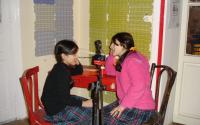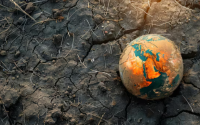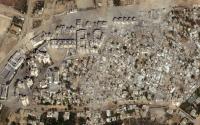The IndependentOctober 2, 2003
Abu Dis, West Bank - The wall in Abu Dis runs down the middle of a street. You used to be able to stroll from the money changers on one side to the tea shop on the other in less than a minute. Now the round trip takes half an hour.
The wall is about 10 feet high, a series of concrete slabs topped with barbed wire. And every morning, at about 7am, Khaled Ideisat, a father of seven, scrambles over it like a furtive child stealing apples.
Mr Ideisat is trying to get to work in Arab east Jerusalem. Most mornings the Israeli army shoots tear-gas canisters at him. His daily commute starts at 3.30am, from his home in the West Bank town of Yatta. From there, he has to make a series of journeys on back roads, scrabbling over the hills on foot every so often to avoid the Israeli checkpoints, before connecting with a new taxi on a different road. In total, he walks five miles and uses six different cars.
It used to be bad enough. But since the Israelis built the wall in August last year, it has been worse. Abu Dis used to be part of the suburbs of Arab east Jerusalem. But now Abu Dis lies behind part of Jerusalem's new "security" wall.
Walls are going up all over the West Bank, slicing through suburbs of Jerusalem. The Israeli Cabinet voted yesterday to go ahead with a particularly controversial section of its "security fence", which Palestinians call Israel's Berlin Wall. The Cabinet approved a new stretch of the fence east of the Jewish settlements of Ariel and Kedumim deep inside the West Bank, that will have to cut 17 miles into the West Bank to keep the settlements on the "Israeli" side. It is a decision that some observers are warning could mean the death of President George Bush's "two-state solution".
As Mr Ideisat tells his story, four Palestinian women try to climb over the wall, carrying huge bundles of fresh cucumbers, mint leaves and radishes on their heads.
The Israeli soldiers on the other side order them back, and they climb down, despondent, and sit waiting for the soldiers to leave. It is a long wait.
There is no employment for Mr Ideisat, a construction worker, on this side of the wall. He has to get across to have any chance of breaking even on the £9 he paid to get here today, let alone make any money to take home to his family.
He said: "If a father has no income and cannot feed his children, his life has no meaning. He will be humiliated in front of his children and it's better for him to blow himself up."
Soon it will be even worse for Mr Ideisat. This wall, which it is possible to clamber over when the Israeli soldiers are not looking, will soon be replaced with a more permanent wall that will be all but impossible to cross. Abu Dis is being cut off from the city.
When President Bush promised an independent Palestinian state as part of a peace deal, Palestinians dreamt of a state on most of the occupied West Bank and Gaza Strip. But the walls and fences that Israel is building are carving huge swaths out of that land. When all the barriers are built, many are now warning, what is left may not be enough for a state. They say it is unlikely that the Palestinians will accept peace on these grounds. Israel insists that is not the purpose of its "security fence". But the Americans are threatening to deduct from $9bn of loan guarantees it has given Israel the cost of sections that stray too far from the internationally recognised Green Line dividing Israel from the West Bank .
In an effort to allay American fears, the Israeli Cabinet decided not to join the new stretches of fence east of Ariel and Kedumim to the main fence for the time being, but to leave a gap pending further discussions with the US.
The Israeli government says the fence can still be moved as part of a peace deal, and that it is only being built to stop suicide bombers crossing into Israel. And no suicide bomber has managed to breach any of the stretches that have been built so far, either a combination of two 15-metre-high metal fences, one equipped with electronic sensors, and deep trenches, or towering concrete walls.
Israeli public opinion, ground down by the constant spectre of suicide bombing, is solidly behind the "security fence". Suicide bombings and other militant attacks have killed at least 552 Israeli civilians, and Israelis want a wall that they believe can keep the bombers out. Ariel Sharon, the Prime Minister, was originally against the barrier, and was dragged into it by the public mood. But he has been a driving force behind the new route which cuts deep into the West Bank.
The debate at the Israeli cabinet meeting was not over whether to build the fence. The opposition to Mr Sharon's proposal, which was eventually approved, came from ministers such as Nathan Sharansky who insisted Israel should not bow to US pressure but join the Ariel and Kedumim fences to the main barrier.
The barrier's opponents say a fence whose sole aim was to keep out suicide bombers could run along the Green Line and avoid all the controversy. The stretches that have been built so far have repeatedly strayed by as much as a mile into the West Bank. The new fences around Ariel and Kedumim will cut much deeper. That, say the Palestinians, is because the aim of the wall is to take as much West Bank land for Israel as possible.
And it's not just the Palestinians who fear this may be the case. President Bush's National Security Adviser, Condoleezza Rice, told the Israeli Cabinet that it looked like an attempt to establish a new de facto border. An increasing number of observers are now saying that the fences and walls look like an attempt to pre-empt any peace deal.
However the US State Department spokesman, Richard Boucher, declined publicly to criticise the latest decision. He said simply that US views on the fence, which President Bush has described as a "problem", had not changed.
The original aim of the settlements now being included on the "Israeli" side of the wall, which are built on occupied land in contravention of international law, was to stake a claim to the West Bank as Israeli land.
The effects on Palestinians from the sections of wall built so far have been disastrous. Entire villages have been cut off from the rest of the West Bank. Palestinian farmers isolated from their fields have been forced to move their families to sleep in tents on their land so as not to lose their crops. Palestinian schoolchildren have to queue for hours at Israeli checkpoints to be allowed to cross the wall to school, or to cross back to get home. The city of Qalqilya is completely surrounded by huge concrete walls to protect the new Trans-Israel Highway from shootings.
And that has all been from walls and fences which have only crossed up to a mile or so into the West Bank. The new fence approved yesterday will cut far deeper.






